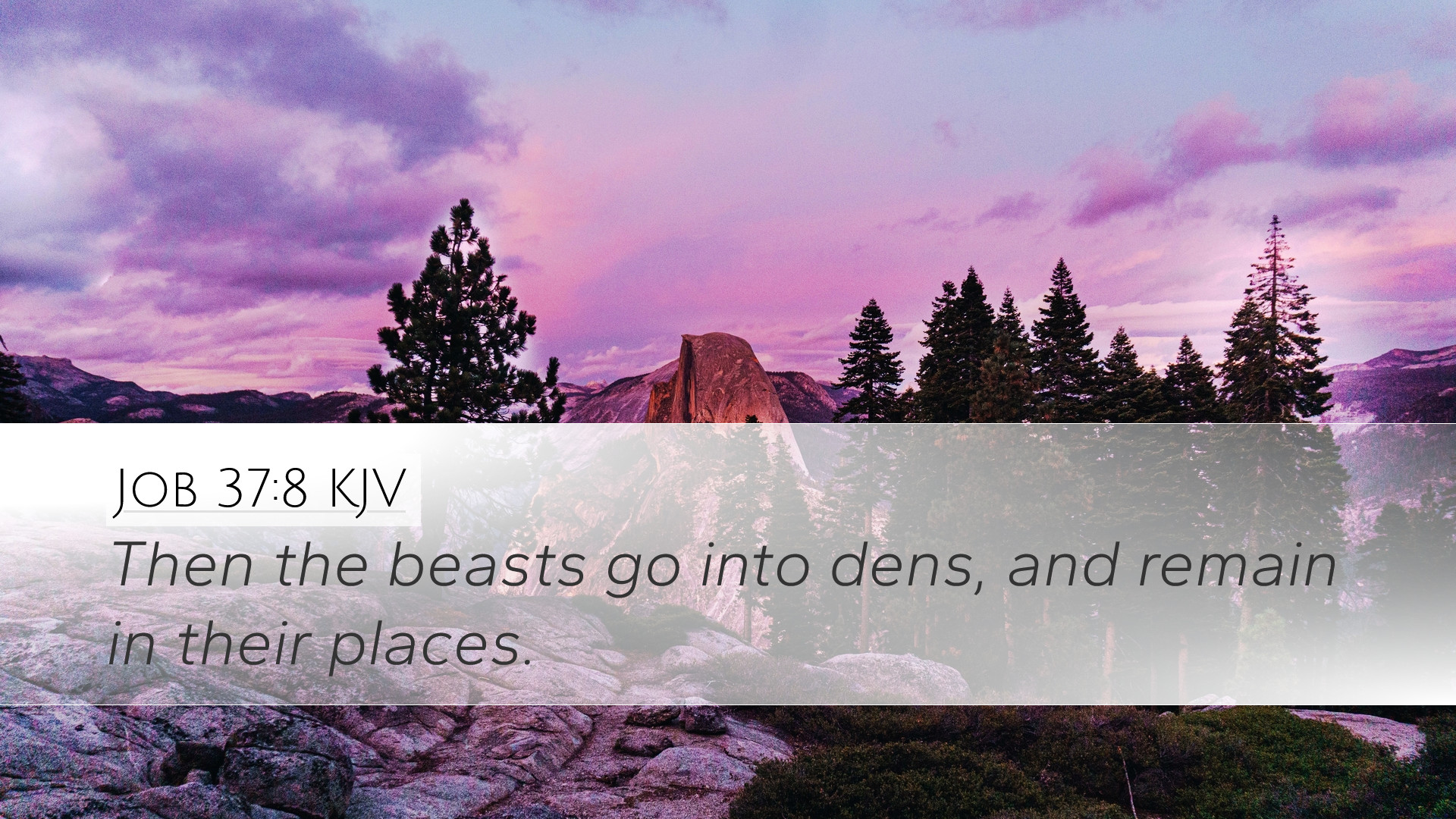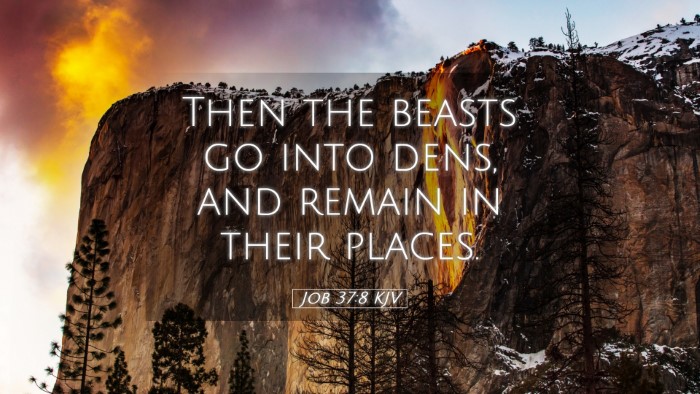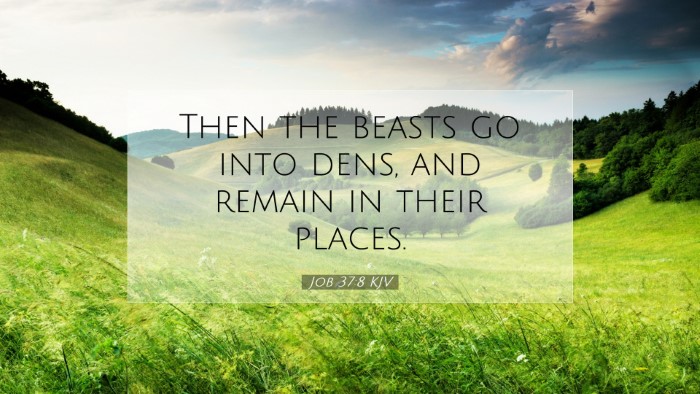Old Testament
Genesis Exodus Leviticus Numbers Deuteronomy Joshua Judges Ruth 1 Samuel 2 Samuel 1 Kings 2 Kings 1 Chronicles 2 Chronicles Ezra Nehemiah Esther Job Psalms Proverbs Ecclesiastes Song of Solomon Isaiah Jeremiah Lamentations Ezekiel Daniel Hosea Joel Amos Obadiah Jonah Micah Nahum Habakkuk Zephaniah Haggai Zechariah MalachiJob 37:8
Job 37:8 KJV
Then the beasts go into dens, and remain in their places.
Job 37:8 Bible Commentary
Commentary on Job 37:8
Bible Verse: Job 37:8 - "Then the beasts go into dens, and remain in their places."
Introduction
The Book of Job serves as a profound exploration of suffering, the nature of God, and the human condition. Chapter 37 highlights a transition to the grand design of creation, emphasizing God’s omnipotence, especially as it relates to nature and the moral order of the universe. In this verse, the text implies a contrast between the instinctual behaviors of animals and the higher understanding expected of humanity.
Contextual Analysis
In the previous chapters, God reveals His sovereignty through the grandeur of nature. Job is reminded of the Creator's power expressed in thunder, storms, and snow, emphasizing that creation itself intimates divine reality. Verse 8 provides a vivid picture of the natural instinct of animals, suggesting the order set by God within creation.
Insights from Public Domain Commentaries
Matthew Henry’s Commentary
Matthew Henry observes that the statement regarding beasts retreating to their dens serves a dual purpose. Firstly, it underlines the instinctual behavior of animals as part of the created order, reflecting their created nature. Secondly, it serves as a metaphor for humanity retreating in times of trouble, encapsulating a broader principle about safety and security. As beasts seek refuge in dens, so too should humans seek refuge in God during tumultuous times, illustrating a dependence on the Creator.
Albert Barnes’ Notes on the Bible
Albert Barnes emphasizes the providential care of God as seen through the instincts of animals. The reference to beasts going into dens highlights the wisdom imbued in creation. Barnes draws attention to how this behavior reflects God’s orchestration in providing for the creatures’ needs and safety. Moreover, Barnes posits that the imagery evokes a sense of order and design in a world marked by chaos, ultimately reaffirming the belief that nature operates under divine supervision.
Adam Clarke’s Commentary
Adam Clarke interprets this verse by emphasizing the natural order present in creation. He notes that beasts knowing their dens exemplifies an inherent wisdom in animals, which contrasts sharply with human folly. Clarke suggests that God’s creative purposes are consistently realized in nature, calling humans to recognize their place within the created order. He warns against pride and self-sufficiency, encouraging readers to acknowledge their dependence on God, much like the animals rely on their dens for protection.
Theological Implications
Job 37:8 invites theological reflection on several fronts. Firstly, it presents a robust depiction of God’s sovereignty not just in the whimsical aspects of natural phenomena, but also in the orderly behavior of animals, reminding believers of God’s intimate involvement in creation. Secondly, it underlines a principle of divine providence, where every creature, no matter how great or small, operates under a supreme moral order governed by God.
- Divine Sovereignty: God’s control is overarching and unwavering, extending to every creature within the cosmos.
- Human Dependence: The instinctual behaviors of animals juxtaposed with human behavior reveal a call for humility. Humans, in their rationality, often stray from the simple obedience exemplified by nature.
- Creation’s Reliability: Just as animals find safety in their dens, believers are reassured to take refuge in God amidst the trials of life.
Practical Applications
This verse, rich in imagery and meaning, offers several practical applications for contemporary readers.
- Seek Refuge in God: In times of distress or uncertainty, like animals retreating to their dens, we should remember to turn to God for shelter and comfort.
- Recognize God’s Order in Creation: As we witness the consistency and instinctive order of nature, we are prompted to reflect on the divine wisdom behind creation, drawing us closer to the Creator.
- Cultivate Humility: The wisdom of creation serves as a reminder to embrace humility. We are called to acknowledge our limitations and our need for divine guidance.
Conclusion
Job 37:8 encapsulates profound truths about God’s creative order, the instinctual nature of creatures, and human dependence on divine providence. As we contemplate this scripture, we are reminded to seek our safety and sustenance in the faithfulness of God. The insights drawn from this verse encourage us to embrace humility and wisdom as we navigate the complexities of life.


